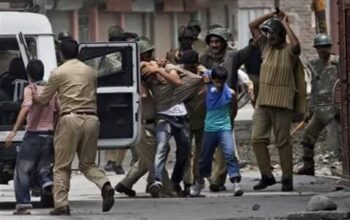By Staff Reporter
ISLAMABAD: Pakistan’s $7 billion International Monetary Fund program remains firmly on course, a top official said on Friday, brushing aside India’s calls for the lender to reassess the country’s financial support.
Tension escalated between India and Pakistan following an April 22 attack in occupied Kashmir’s Pahalgam town, where gunmen killed 26 people in one of the deadliest assaults on civilians in nearly two decades.
Khurram Schehzad, adviser to the Finance Minister, said the IMF review process is progressing smoothly, bolstered by robust talks with the fund and other global financial bodies.
“The latest review has been done well and we are completely on track,” Schehzad said, adding that Pakistan had very productive spring meetings with financial institutions in Washington.
“We did about 70 meetings … interest has been very high for investing and supporting Pakistan as the economy turns around.”
The remarks follow a Reuters report that said India has asked global multilateral agencies, including the IMF, to review funds and loans provided to Pakistan, as New Delhi seeks “to corner the neighbouring state diplomatically”.
“We will be asking all multilateral agencies to review the loans and support to Pakistan,” Reuters quoted a government source as saying. Neither the IMF nor India’s finance ministry commented.
Pakistan secured a $7 billion Extended Fund Facility last year and was granted a new $1.3 billion climate resilience loan in March. The IMF’s Executive Board will convene May 9 to evaluate Pakistan’s staff-level agreement and review its bailout progress—key to sustaining momentum.
Pakistan has been struggling with boom-and-bust economic cycles for decades, leading to 22 IMF bailouts since 1958. Currently the country is the IMF’s fifth-largest debtor, owing the Fund $6.28 billion as of July 11, 2024.
The country’s last IMF program helped avert a sovereign default amid a sharp decline in foreign exchange reserves, currency depreciation and record inflation.
India claimed cross-border involvement in the attack without providing evidence, an accusation Pakistan has rejected, calling instead for a neutral investigation.
India suspended the Indus Water Treaty, a decades-old agreement governing shared river resources, while both nations closed their airspace to each other’s airlines, further straining relations between the nuclear-armed neighbors.
India expelled Pakistani diplomats and nationals, closed a key border crossing and suspended the decades-old Indus Waters Treaty (IWT), which has governed the distribution of river waters between the two countries since 1960.
Pakistan retaliated and closed its air space for Indian airlines, suspended all trade including through third countries and halted special South Asian visas issued to Indian nationals. Islamabad will also exercise the right to hold all bilateral accords with India, including Simla Agreement, in abeyance until New Delhi desists from “fomenting terrorism inside Pakistan”
The tit-for-tat announcements took relations between the nuclear-armed neighbours, who have fought three wars, to the lowest level in years.
Global leaders urge calm in both countries, which have fought three wars since gaining independence in 1947 and two over the Kashmir dispute. The Kashmir dispute, dating back to the 1947 partition of India and Pakistan, remains a volatile issue.
Muslim-majority Kashmir is claimed in full by both Hindu-majority India and Pakistan, although each controls only a part of the Himalayan region. The LoC, a heavily militarized de facto border, has seen frequent skirmishes, with both sides accusing each other of ceasefire violations.
Hindu nationalist ruling Narendra Modi government and its allied media call for military action. Islamabad has warned it would deliver a “befitting response” to any aggression.
Copyright © 2021 Independent Pakistan | All rights reserved




